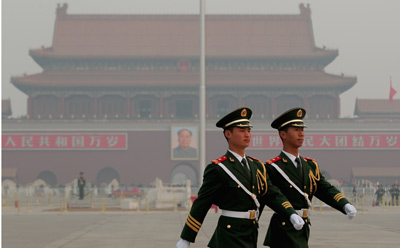Chinese fail to hide the news of Tiananmen suicide bid
First case of self-immolation in Tiananmen Square in a decade is caught on camera by British tourist

A free daily email with the biggest news stories of the day – and the best features from TheWeek.com
You are now subscribed
Your newsletter sign-up was successful
THE CHINESE government has today confirmed what is thought to be the first case of self-immolation in Beijing's symbolic Tiananmen Square since 2001, after attempts to cover up the incident were foiled by an onlooker who leaked photos to The Daily Telegraph. The 42-year-old man, who survived the ordeal, is known only as Wang (his surname). He set himself on fire on 21 October near the bridge that leads into Chairman Mao's Memorial Hall, the much-photographed building from which the large picture of the former Chinese leader hangs. Tourist Alan Brown from Somerset told the Telegraph that it happened mere metres from him. "He said something quickly and a policeman nearby was suddenly agitated, but this chap whipped out his lighter and set himself on fire. The policeman initially leapt back and then grabbed a fire extinguisher from his motorbike and put the man out." "Without being melodramatic," Brown continued, "he looked straight at me and set himself on fire." The photo shows clearly that the square was crowded at the time. But according to the Telegraph's Peter Foster, the incident has not been mentioned anywhere in the Chinese media, not even on China's equivalent of Twitter, Weibo. According to witnesses, all traces of the self-immolation had disappeared within ten minutes. The Beijing Public Security Bureau today confirmed that Wang has "pulled through", and that he took the "extreme action because of discontent over the outcome of a civil litigation in a local court". No more details were provided.
Chinese authorities have been sensitive to any protests in Tiananmen Square since the international revulsion at the massacre of hundreds of demonstrators in June 1989.
Although the last known case of self-immolation in the square was in 2001, the Telegraph reports that the act is relatively common in other parts of the country. At least one or two incidents are reported a year, most involving "victims of unjust court rulings, land grabs, property disputes with local government or extreme examples of corruption".
The Week
Escape your echo chamber. Get the facts behind the news, plus analysis from multiple perspectives.

Sign up for The Week's Free Newsletters
From our morning news briefing to a weekly Good News Newsletter, get the best of The Week delivered directly to your inbox.
From our morning news briefing to a weekly Good News Newsletter, get the best of The Week delivered directly to your inbox.
A free daily email with the biggest news stories of the day – and the best features from TheWeek.com
-
 Crisis in Cuba: a ‘golden opportunity’ for Washington?
Crisis in Cuba: a ‘golden opportunity’ for Washington?Talking Point The Trump administration is applying the pressure, and with Latin America swinging to the right, Havana is becoming more ‘politically isolated’
-
 5 thoroughly redacted cartoons about Pam Bondi protecting predators
5 thoroughly redacted cartoons about Pam Bondi protecting predatorsCartoons Artists take on the real victim, types of protection, and more
-
 Palestine Action and the trouble with defining terrorism
Palestine Action and the trouble with defining terrorismIn the Spotlight The issues with proscribing the group ‘became apparent as soon as the police began putting it into practice’
-
 Epstein files topple law CEO, roil UK government
Epstein files topple law CEO, roil UK governmentSpeed Read Peter Mandelson, Britain’s former ambassador to the US, is caught up in the scandal
-
 Iran and US prepare to meet after skirmishes
Iran and US prepare to meet after skirmishesSpeed Read The incident comes amid heightened tensions in the Middle East
-
 Israel retrieves final hostage’s body from Gaza
Israel retrieves final hostage’s body from GazaSpeed Read The 24-year-old police officer was killed during the initial Hamas attack
-
 China’s Xi targets top general in growing purge
China’s Xi targets top general in growing purgeSpeed Read Zhang Youxia is being investigated over ‘grave violations’ of the law
-
 Panama and Canada are negotiating over a crucial copper mine
Panama and Canada are negotiating over a crucial copper mineIn the Spotlight Panama is set to make a final decision on the mine this summer
-
 Why Greenland’s natural resources are nearly impossible to mine
Why Greenland’s natural resources are nearly impossible to mineThe Explainer The country’s natural landscape makes the task extremely difficult
-
 Iran cuts internet as protests escalate
Iran cuts internet as protests escalateSpeed Reada Government buildings across the country have been set on fire
-
 US nabs ‘shadow’ tanker claimed by Russia
US nabs ‘shadow’ tanker claimed by RussiaSpeed Read The ship was one of two vessels seized by the US military